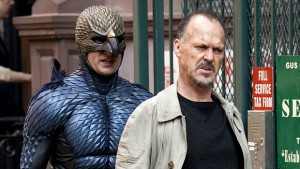Birdman
Birdman or (The Unexpected Virtue of Ignorance), 2014, 4 ¾ stars
Birdman soars
Michael Keaton reaches great heights in comeback film
 From The Orlando Weekly, November 7, 2014; and The San Antonio Current, October 29, 2014
From The Orlando Weekly, November 7, 2014; and The San Antonio Current, October 29, 2014
We all need cinematic heroes, and Birdman, both character and film, fits the role with aplomb. Designed to aesthetically challenge, frustrate, inspire, amuse and amaze, Alejandro González Iñárritu’s new movie – and I do mean new – is the best I’ve seen so far this year.
Michael Keaton, as Riggan, is an aging has-been of an actor, clinging to a belief that he’s still important years after his iconic Birdman movie character was put out to pasture. In an attempt to recapture his artistic integrity, he brings to the Broadway stage an ambitious adaptation of Raymond Carver’s What We Talk About When We Talk About Love. In doing so, he also longs to prove to his ex-wife (Amy Ryan), his lover (Andrea Riseborough) and his daughter (Emma Stone) that he is still relevant.
Starring in the Carver production are Mike (Edward Norton), Lesley (Naomi Watts) and Riggan himself, and the endless disasters leading up to the production’s opening make the shenanigans of Woody Allen’s Bullets Over Broadway (from which Birdman borrows a hilarious gag) look like children’s theatre. Holding it all together is Riggan’s friend and manager (the superb Zach Galifianakis). But despite the gifted cast, this is all about Keaton, and in a metatheatrical, even deconstructionist way, he embraces the role, which is not surprising considering the similarities between his career and Riggan’s.
“I’ve got a chance to do something right. I gotta take it,” Riggan says, only to be reminded by Mike that “popularity is the slutty little cousin of prestige.”
“Popularity is the slutty little cousin of prestige.”
The other star is the cinematography by Emmanuel Lubezki, who won an Oscar for Gravity. With his floating Steadicam, and with help from nifty special effects and clever editing, he has made Birdman appear as one continuous take. We’ve all seen one-shot experiments before, but this may be the best – and most original, as the action is not in real time but over many days, necessitating surreal scenes transitions while maintaining the single-shot construct.
In a delicious sub-plot, Riggan’s play is reviewed by a hardened theatre critic with the power to destroy dreams in a single sentence. Yet even she must admit that the play – like the movie it’s part of – is infused with “super realism,” something Iñárritu (21 Grams, Babel) calls “inescapable reality.” So even if you don’t like Birdman, you will be unable to forget its unique ability to disguise meticulous, well-rehearsed craftsmanship as irresistible improvisation.
Despite its originality, Birdman doesn’t fly quite as high as it could. At two hours, it seems just a tad too long, and we yearn to get better acquainted with Galifianakis’s character and Riggan’s lover instead of dwelling on a flirtation between Stone and Norton’s characters. The style – reminiscent of a jazz riff – may not be everyone’s scene, either. Such free-form jazz can, after all, hit sour notes occasionally. But I’ve simply never seen anything like this blend of brilliant hidden jokes, Charlie Kaufman ambience, fantasy-based realism and dreamlike yet intensely personal camerawork, and I doubt you have either.
One shot may be all we need in Birdman, but we often need a second shot in life. Thanks to Iñárritu, Keaton has gotten that extra shot, and the cinema is a slightly more wonderful place because of it.
© 2014 Orlando Weekly / MeierMovies, LLC